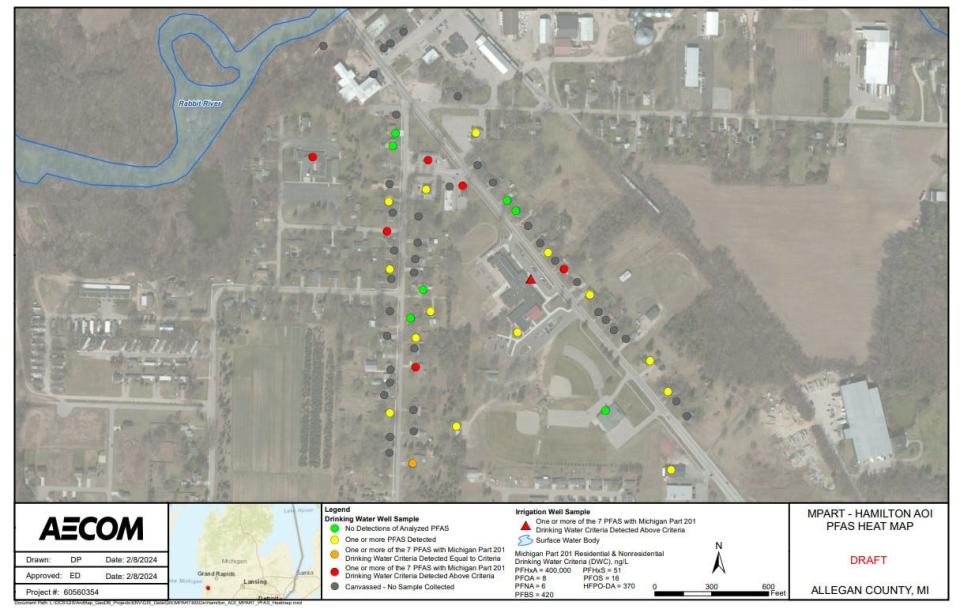State investigating PFAS contamination in Hamilton
HEATH TWP. — Michigan’s PFAS Action Response Team has opened a new investigation in Hamilton, declaring an area of interest in Heath Township.
Several drinking wells in Hamilton were recently tested for PFAS. Results showed two shallow wells contained PFAS at concentrations above drinking water criteria, according to the MPART website. A drinking well tested at 50 parts per trillion of PFOA, or perfluorooctanoic acid, while an irrigation well tested at 19 parts per trillion.
In response, the Michigan Department of Environment, Great Lakes and Energy; Michigan Department of Health and Human Services; and the Allegan County Health Department established a study area — the Hamilton Area of Interest — around the contaminated wells.

The study area is bound by Lincoln Avenue (M-40) to the west, Hubbard Street to the east, 134th Avenue to the south and Rabbit River to the north. The study is meant to determine if there's a potential source of PFAS contamination in the immediate vicinity.
There is no municipal water system in the Hamilton area, where residents rely on private wells.
A total of 29 wells in the AOI have been tested in total, as of February 2024. Seven of those have contained PFAS at concentrations above those set in Michigan drinking water standards. The highest results were 50 ppt PFOA and 28 ppt PFOS — or perfluorooctane sulfonic acid. The safety standards for PFOA and PFOS are 8 and 16 ppt, respectively.

Another 14 wells had PFAS detected, but below the threshold listed in state standards. Seven wells had no detections of analyzed PFAS.
Ray Spaulding, site lead for EGLE, said the department sent letters to everyone in the study area and canvassed unresponsive residents.
“Testing was offered to everyone inside the study area at no charge,” Spaulding wrote in an email to The Sentinel. “Residents should get their water tested if they live inside the study area and get a filter if any PFAS is detected in their drinking water.”
MDHHS and ACHD are providing filters to affected residents, Spaulding wrote.
One local school building, Hamilton Elementary, is located within the AOI. The district sent information to parents, saying the school’s drinking water is regularly tested and meets safety requirements.
“Please know that Hamilton Community Schools conducts regular testing according to all requirements set forth by local and state departments,” a message from Superintendent Brad Lusk reads. “Please note that throughout all of our required testing, all drinking water which comes into Hamilton Elementary is safe and is well under the established safe water thresholds for any contaminants.”
Subscribe: Receive unlimited digital access to your local news coverage
An irrigation well at the school did test above safety standards, but HCS said that well “does not serve the building for usable water.”
“Keeping our students and staff safe is a top priority for Hamilton Community Schools and we will continue to do so each day,” Lusk wrote.
This spring, EGLE will expand the study area to include approximately two dozen additional wells located northwest of the current study area, according to the investigation page.
According to the Environmental Protection Agency, PFAS (per-and polyfluoroalkyl substances) are widely used, long lasting chemicals which break down very slowly over time. Due to their widespread use and persistence in the environment, many PFAS are found in the blood of people and animals all over the world.
Studies have shown that exposure to some PFAS in the environment may be linked to harmful health effects in humans and animals.
For more information, visit michigan.gov/pfasresponse.
— Contact reporter Mitchell Boatman at mboatman@hollandsentinel.com.
This article originally appeared on The Holland Sentinel: State investigating PFAS contamination in Hamilton

